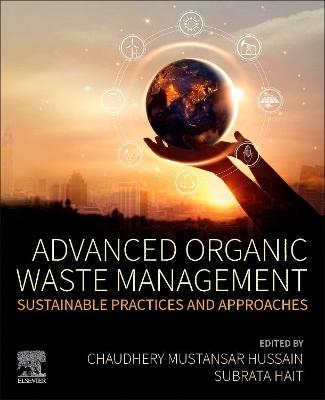
Advanced Organic Waste Management
Elsevier - Health Sciences Division (Verlag)
978-0-323-85792-5 (ISBN)
Sections cover global organic waste generation, encompassing sources and types, composition and characteristics, focus on technical aspects related to various resource recovery techniques like composting and vermicomposting, cover various waste-to-energy technologies, illustrate various environmental management tools for organic waste, present innovative organic waste management practices and strategies complemented by detailed case studies, introduce the circular bioeconomy approach, and more.
Subrata Hait, Associate Professor, Indian Institute of Technology Patna, India Subrata Hait, PhD is an Associate Professor in the Department of Civil and Environmental Engineering at Indian Institute of Technology (IIT) Patna, Bihar, India. His current research interests include waste treatment and resource recovery, solid and hazardous waste management, composting and vermicomposting of organic waste, e-waste management. He has authored many papers at his credit in various international journals in addition to several book chapters. Apart from serving as a reviewer for different international journals published by the leading publishers including Elsevier, Dr. Hait is serving as an Academic Editor of PLOS One and an Editorial Board Member of SN Applied Sciences. Chaudhery Mustansar Hussain is an Adjunct Professor and Director of laboratories in the Department of Chemistry & Environmental Sciences at the New Jersey Institute of Technology (NJIT), United States. His research is focused on the applications of nanotechnology and advanced materials, environmental management, analytical chemistry, and other various industries. Dr. Hussain is the author of numerous papers in peer-reviewed journals as well as a prolific author and editor of around 150 books, including scientific monographs and handbooks in his research areas.
PART 1: Organic Waste: Generation, Composition, and Health Hazards 1. Worldwide Organic Waste Generation – Developing and Developed Countries 2. Composition and Characteristics of Organic Waste - Domestic, Industrial, and Natural Sources 3. Environmental and Health Hazards
PART 2: Resource Recovery from Organic Waste 4. Composting and Vermicomposting 5. Do-It-Yourself (DIY) Composting and Vermicomposting for Urban Households 6. Novel Techniques – Contained Composting System and Rotary Drum Composting System 7. Case Studies
PART 3: Energy Recovery from Organic Waste 8. Advances in Anaerobic Digestion for Biogas Production 9. Household Biomethanizer 10. Hydrothermal Carbonization 11. Compost-Heated Greenhouse for Carbon Harvesting 12. Case Studies
PART 4: Environmental Management Tools for Organic Waste 13. Emerging Regulations and Legislation 14. Life Cycle Assessment 15. Sustainable Social Livelihoods through Organic Waste Management 16. Financial Sustainability of Organic Waste Management – An Economic Analysis 17. Case Studies
PART 5: Innovative Management Practices for Organic Waste 18. Zero Waste and Zero Landfill Paradigm 19. Smart Waste Management Practices and Solutions in Smart Cities 20. Composting Management Open-source Software and Instrumentation 21. Case Studies
PART 6: Circular Bioeconomy in Organic Waste Management 22. Circular Bioeconomy – A Conceptual Framework 23. Integrated Waste Management for Multiproduct Biorefineries in Circular Economy 24. Innovation for Waste Valorization in Bioeconomy – Prospects and Challenges 25. Policy and Governance Implications 26. Case Studies
PART 7: Transition towards Sustainability 27. Resilient Waste Management System in Emergencies like COVID-19 Pandemic – Future Implications for Sustainability 28. Conclusions
| Erscheinungsdatum | 19.01.2022 |
|---|---|
| Zusatzinfo | Approx. 120 illustrations; Illustrations |
| Verlagsort | Philadelphia |
| Sprache | englisch |
| Maße | 191 x 235 mm |
| Gewicht | 1060 g |
| Themenwelt | Naturwissenschaften ► Biologie ► Ökologie / Naturschutz |
| Technik ► Umwelttechnik / Biotechnologie | |
| Weitere Fachgebiete ► Land- / Forstwirtschaft / Fischerei | |
| ISBN-10 | 0-323-85792-2 / 0323857922 |
| ISBN-13 | 978-0-323-85792-5 / 9780323857925 |
| Zustand | Neuware |
| Haben Sie eine Frage zum Produkt? |
aus dem Bereich


